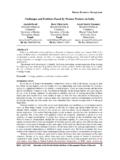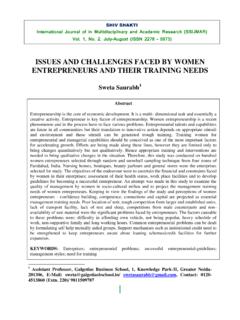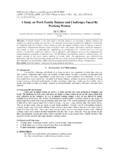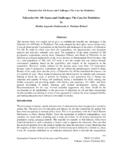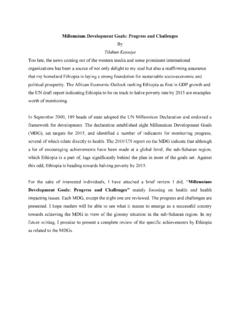Transcription of B uncing o Back - Foreign Service Youth Foundation
1 O B uncing back Staying resilient through the challenges of life 2002, 2006 Ceridian Corporation. All rights reserved. 3 How resilient are you? 9 Ten ways to bounce back 25 Staying resilient through the challenges of life 33 Raising resilient children 39 Bouncing back plan How resili Synonyms: ent are you? adaptable, buoyant, elastic, flexible, optimistic, proactive, resilient, responsive, take-charge. Every day, we face challenges that test our resilience. You may face challenges at work or in your personal relation- ships. You may face the challenge of raising young children or teenagers. Maybe you are caring for an aging family member. You may have financial worries or be going through a divorce. You may be taking on the challenge of a bigger job with more responsibilities.
2 You may have lost a relative recently or be in a time of transition in your life, with friends moving away or a child leaving home. Through all of these challenges and transitions both positive and negative you still have to stay focused at work and at home and take care of yourself and the people you love. That's easier to do the stronger and more resilient you feel. 3. According to the National Centenarian Awareness Project, which studies people in the who have made it to their 100th birthday, there are key characteristics that stand out among men and women this age. They have a positive yet realistic attitude, an adventurous love of life, a strong will, spiritual beliefs, an ability to renegotiate life when necessary, and a sense of humor.
3 They are resilient. How can you develop some or all of these attributes? How can you learn to adopt a positive attitude and be more hopeful and resilient? How can you develop coping skills that will see you through life's ups and downs? The purpose of this booklet is to help you find answers to these and other questions. First, take a moment to answer the questions on the next page. 4. How resilient are you? The first step in becoming more resilient is to look at your life and how you handle stress, problems, and hardship. Where do you feel weak and where do you feel strong in your life? Check the answer that best describes you. 1. I feel a sense of purpose in my work or personal life Yes No Not sure 2. My view of the world is pretty positive.
4 Yes No Not sure 3. I have time for things I enjoy, like being outdoors or being with people I care about. Yes No Not sure 4. When I'm faced with a big problem, I usually come up with a solution. Yes No Not sure 5. When I need help from a friend, relative, or co-worker, I ask for it. Yes No Not sure 5. 6. I take care of myself. I get enough rest and exercise and I eat balanced meals. Yes No Not sure 7. I feel like I'm growing. I'm learning new things and facing new challenges . Yes No Not sure 8. I adapt pretty well to change. Yes No Not sure 9. My life feels busy and active in a good way. Yes No Not sure 10. When I'm stressed, I have things I do to help reduce my stress. Yes No Not sure 6. How resilient you feel on any given day is a sum of all that's going on in your life the pressures and responsibilities you face at work and at home, and how you handle all of those demands.
5 Do you take care of yourself? Are you able to put things in perspective? Do you have the support you need so that you are able to cope well with the challenges you face? If you answered Yes to nine or ten of the questions on the previous page, you're probably a very resilient person. You probably deal well with challenge and adversity. (Chances are, you'll keep reading, since resilient people tend to be curious. Who knows what you might learn?). If you answered Yes to seven or eight of the questions, you're probably a pretty resilient person. But there may be parts of your life where you could become more resilient. On the pages that follow you'll find positive steps you can take and skills you can acquire to help you feel stronger and more in control of things.
6 If you answered Yes to six or fewer of the questions, you may be feeling overwhelmed or under a lot of stress, and these feelings may be affecting your ability to bounce back . On the pages that follow you'll find positive steps you can take and skills you can acquire to help you feel more resilient and to help you handle the challenges you are facing. You might also benefit from talking with a profes- sional about what's going on in your life. As you read through this booklet and begin to try out some of its suggestions, you should start to see improvement in your resilience. Answer these questions again a month from now to see how you are doing. 7. Ten ways to b 8. ounce back Staying resilient is like staying in shape some are born lucky, but most of us have to work at it.
7 Look back to the quiz on page 5. After which statements did you answer No or Not sure ? These are the areas in your life where you may be more or less resilient and where you'll want to focus your efforts. For example, how well do you handle change (question eight)? Do you take care of yourself (question six)? Do you call on others when you need support (question five)? On the following pages you'll find tips and advice to help you work on your outlook and attitude, and on your coping and problem-solving skills all the areas covered in the quiz. 9. 1. Find a sense of purpose and commitment. Studies show that resilient people have a passion or purpose that nour- ishes and sustains them. Look back to how you responded to the first statement on page 5, I feel a sense of purpose in my work or personal life.
8 Do you feel committed to your family, work, friendships, and activities you are involved in outside of work? Here are some ways to build a sense of purpose and commitment into your life: Use challenging life events to stop and think about your choices and to ask fundamental questions. Sometimes it takes a major life event like an illness to make us stop and think about our choices and pri- orities. Smaller challenges are a time to stop and think, too about career and family priorities, how you spend your time, how your life could feel better, richer, or more meaningful. Identify your focus for the next week or month. Purpose and commit- ment sound like lofty words, but they don't have to be. Your focus for the next week or so could be something as basic as, I'm going to spend more time with my father because he's ill.
9 Do volunteer work. Help in a soup kitchen. Join a committee at school. Become a Big Brother or Big Sister. Eleanor Roosevelt said that most of the good work in the world is done by people who weren't feeling all that good at the time. Volunteer work can give you a sense of purpose and make you feel stronger. Complete this sentence: If money were no object and I had all the time in the world, I would .. Travel more? Paint? Work with disabled children? Figure out how to translate your big dreams into action. A big trip may not be possible, but you could take a week- end trip to a place you've never been. You could enroll in a painting class at night, or help out at a school for disabled children. Look for activities outside of work that bring you a sense of personal achievement, satisfaction, or fulfillment.
10 Those activities can sustain you, especially during periods when your work may not feel as ful- filling or satisfying as you might like. 10. 2. Have a positive outlook. Look back to page 5 to see how you responded to the statement, My view of the world is pretty positive. Resilient people tend to have a positive outlook and to see life as filled with challenges rather than defeats. They see difficulties as temporary. Optimism is a skill you can learn. Tell yourself, I'm going to feel better. Tell yourself, Things are going to get better.. Focus on the part of your life that feels good today. One day, things may not be going well at work, but something wonderful may be happening with your relationship. Focus on your relationship that day.
